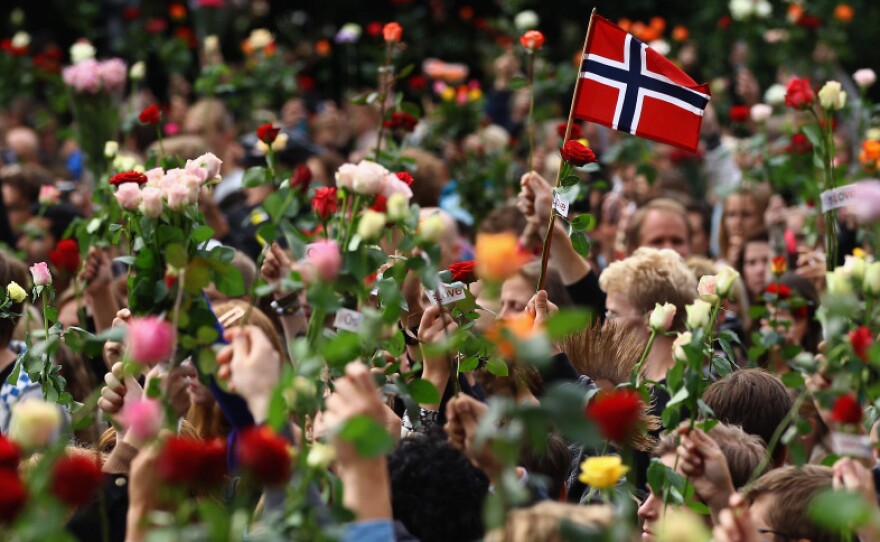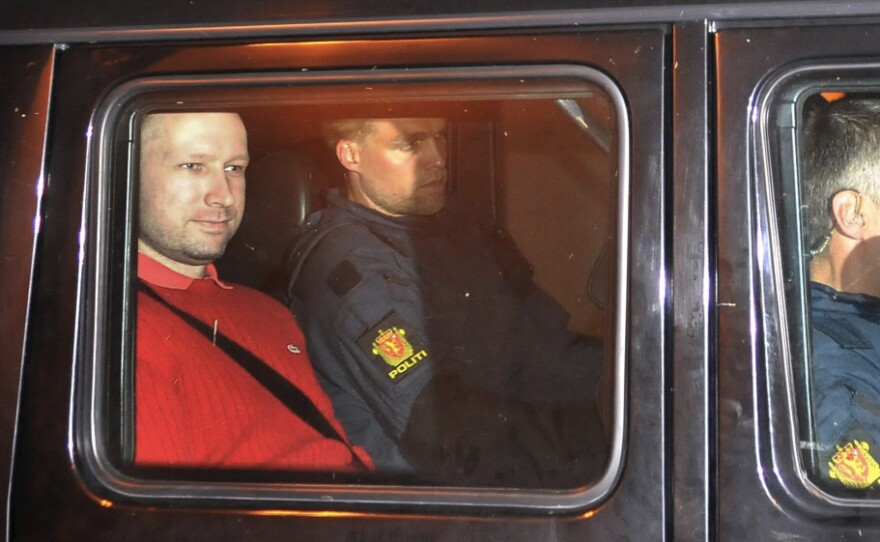Three days after twin attacks in the Norwegian capital killed dozens of people, the man who has acknowledged the bombing and shooting spree was arraigned Monday in a closed-court session and ordered held for eight weeks.
Anders Behring Breivik did not plead guilty to the attacks, which police say killed 76 people. Authorities said they would further investigate a claim Breivik made about the existence of two more extremist "cells."
Meanwhile, Norwegians were beginning to assess the psychological impact of one of peacetime Europe's worst mass killings.
Reporters and locals thronged outside the Oslo courthouse. After a 35-minute hearing, Judge Kim Heger addressed the media and — through a translator — outlined some statements Breivik made to authorities.
"According to what the court understands," the judge said, "the accused believes that he needed to carry out these acts in order to save Norway and Western Europe from, among other things, cultural Marxism and Muslim takeover."
In his 1,500-page manifesto posted on the Internet before Friday's attacks, Breivik had said he wanted to use his court appearance for ideological grandstanding. But the judge rejected his request that the hearing be public.
Heger said the aim of Breivik's violent attacks was to inflict as much harm as possible on Norway's ruling Labor Party, which the suspect accuses of betraying the nation.
Quoting Breivik, the judge said the purpose of the operation was not to kill as many people as possible, "but to give a strong signal that cannot be misunderstood, that as long as the Labor Party keeps driving its ideological line and keeps deconstructing Norwegian culture and mass importing Muslims, then they must assume responsibility for this treason, and any person with a conscience cannot allow its country to be colonized by Muslims."
A Scene Of Confusion
Police revised the total death toll Monday to 76, down from 93, citing confusion at the site of the massacre at the island youth camp outside Oslo as rescuers tried to help survivors.
Iran-born Ali Esbati, a longtime resident of Norway, was one of the people on the island during the attack. A human rights activist, Esbati had been invited to the youth camp to talk about the rise of right-wing politics in Europe.
Esbati said there was panic all of a sudden — everyone running — when he saw a young woman lying on the ground, shot in the mouth, arm and perhaps her neck.
"That was one of the most disturbing things I experienced," Esbati said. "She kept repeating that 'If I die now, just remember you are all fantastic.' And this was a girl of 18 or 19 years old, and she ... was repeating that 'I can see in your eyes that you are afraid, so I know I will die.'"

Esbati said he does not know what happened to her. The shots got closer as he ran to the edge of the lake.
"Just at that moment, when I was standing close to the water, then I saw the guy — he showed up just 15 meters from me, up on a rock, and he had a large rifle," Esbati said. "He shouted something. ... I think it was either 'It's the police' or 'It's OK,' so he tried to, you know, soothe people and make them come to [him], but he started shooting immediately."
Flowers And Tears
At noon Monday, Norway observed a minute of silence.
In Oslo, crowds flocked to the many shrines of flowers and messages that have cropped up around the city. Men and women hugged one another; many could not hold back their tears.
At the cathedral, Lutheran pastor Jan Christian Nelson assessed the national mood and tried to look forward.
"I think many are afraid now," he said. "But I think that also this makes us more conscious about the importance of talking against extreme opinions and [being] more aware about how things we say can be used for terrible actions."
Outside the university, people applauded, as survivors of the youth camp massacre lined up to be the first to sign a national book of condolence.
Copyright 2022 NPR. To see more, visit https://www.npr.org. 9(MDAzMjM2NDYzMDEyMzc1Njk5NjAxNzY3OQ001))







